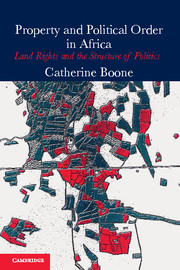Book contents
- Frontmatter
- Dedication
- Contents
- List of Figures, Tables and Maps
- Preface and Acknowledgments
- 1 Introduction
- Part I Property Rights and the Structure of Politics
- Part II
- Ethnicity
- 4 Ethnic Strangers as Second-Class Citizens
- 5 Ethnic Strangers as Protected Clients of the State
- Part III
- Part IV
- Appendix Land Politics Cases and Sources
- References
- Index
Ethnicity
Property Institutions and Ethnic Cleavage
Published online by Cambridge University Press: 05 June 2014
- Frontmatter
- Dedication
- Contents
- List of Figures, Tables and Maps
- Preface and Acknowledgments
- 1 Introduction
- Part I Property Rights and the Structure of Politics
- Part II
- Ethnicity
- 4 Ethnic Strangers as Second-Class Citizens
- 5 Ethnic Strangers as Protected Clients of the State
- Part III
- Part IV
- Appendix Land Politics Cases and Sources
- References
- Index
Summary
Ethnic labels “code people according to their relation to property.”
(Ojalammi 2006, 1)There is an image of rural Africa as settled by small, culturally homogeneous communities, but for much of the continent, it is a misconception. As Berman et al. note in Ethnicity and Democracy in Africa, ethnically homogenous localities and regions are “increasingly hard to find” (2004, 12–13). In-migration is a pervasive dynamic across land-abundant, labor-scarce parts of rural Africa, and in certain regions and districts, this has been the case for much of the past century. The chapters in Part II of this book show that within jurisdictions of heavy in-migration, Africa's customary and statist land tenure institutions channel tensions around land scarcity into political form as ethnic cleavages, claims, and conflict. And as land regimes vary, so, too, do the character and structure of ethnic conflict over land.
Under the so-called customary land regimes, in-migration and settlement in ethnic jurisdictions that have been defined by the state has often been organized through “landlord-stranger” relationships. The newcomers are defined as strangers or outsiders. They assume the subordinate status of clients, tenants, sharecroppers, or guests of the customary landholders. Yet as Cotula, Toulmin, and Hesse (2004, 22) write, “landlord-stranger relations are breaking down in much of Africa” under the pressures of the current era. A widespread source of pressure on these relationships is population pressure on the land. As competition for land intensifies, “a common response is to restrict outsiders’ access to those resources.” The Senegal River Valley, where ethnic strangers have been gradually marginalized over time, provides a case in point: “An immediate upshot of the growing scarcity of land is that stranger farmers are being increasingly denied their rights of access to land, especially to plots of relatively high quality.…Similar events have occurred in many places in sub-Saharan Africa, and violent conflicts have resulted in not a few cases” (Platteau, 2002, 8). Ethnic strangers are not always the losers, however.
- Type
- Chapter
- Information
- Property and Political Order in AfricaLand Rights and the Structure of Politics, pp. 91 - 99Publisher: Cambridge University PressPrint publication year: 2014
- 1
- Cited by



